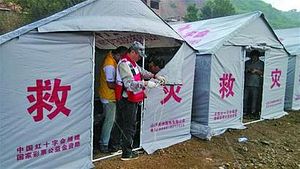As China seeks to continue the flow of aid to Yunnan, site of a major earthquake on August 3, China’s major charity organization continues to be plagued by trust and credibility issues. The Red Cross Society of China (RCSC), which exists under the aegis of the Chinese government, has been hit hard by a number of scandals in the past five years. In 2008, RCSC received a record number of donations in response to the 2008 Sichuan earthquake. Since then, donations have plummeted as Chinese citizens wonder whether their money is merely going to line officials’ pockets.
RCSC’s troubles started in 2011, when a young woman calling herself Guo Meimei posted numerous pictures of a lavish lifestyle on Sina Weibo. Guo claimed to be a manager of the Chinese Red Cross, and her postings sparked outrage from netizens who saw them as evidence that donations to RCSC were being embezzled. RCSC denied any affiliation with Guo, and Guo admitted in a recent (and highly publicized) television confession that she had lied about having a position with RCSC.
Still, the damage had been done. Online sleuths digging into RCSC affairs in response to Guo’s posts found a number of more substantial scandals — including misappropriated donations that were meant to go to victims of the 2008 Sichuan earthquake. As a result of the scandal, donations to RCSC decreased year-on-year in both 2011 and 2012, and total donations dropped to nearly 10 percent of the record totals of 2008. That’s an especially big problem in China, as donations to RCSC make up close to 70 percent of the country’s total charitably donations, according to Xinhua.
In response to the Yunnan earthquake, the RCSC issued a public plea for people to “forget about” Guo Meimei and donate to relief efforts. In an unfortunate case of timing, however, Guo’s public confession aired the same day as the Yunnan earthquake, drudging up the old scandal at a time when RCSC could least afford it.
Though Guo Meimei has since denied ever working for RCSC, the organization’s image remains tainted. Back in 2011, when the scandal hit, People’s Daily waded into the fray to argue that the issue was not Guo Meimei per se, but the larger problem of “establishing a fair, transparent and reliable charitable organization.” South China Morning Post expressed a similar viewpoint in a commentary on Monday. “It will take more than Guo’s conviction to clean up corrupt mismanagement … [RCSC] needs to do more to regain public confidence, like focusing on accountability and transparency in carrying out humanitarian work,” SCMP wrote.
It’s hard to estimate the impact of the RCSC’s damaged credibility on relief efforts. Money is still coming in — on August 8, less than a week after the earthquake, the International Federation of Red Cross and Red Crescent Societies reported that RCSC had received 72.49 million RMB ($11.77 million) in total donations, including around $7.65 million in monetary donations. For comparison purposes, Tea Leaf Nation reports that after a 2013 earthquake in Sichuan, RCSC raised 142,000 RMB ($23,000) in 11 days. Over the same period, Jet Li’s privately-run One Foundation raised over 22 million RMB ($3.5 million). So far, RCSC’s reported donations are far exceeding the totals of 2013, but economics professor Hu Xingou told Voice of America the total remained “a relatively small amount” given the scale of the Yunnan earthquake. Chinese citizens, as in 2013, may be choosing to funnel their donations to other organizations.
Some of the distrust for the RCSC comes from its status as a government-run organization at a time when suspicions about corrupt officials are running high. In this regard, Xi Jinping’s vigorous push to clean up corruption within China’s government and state-owned enterprises could help restore public faith in all China’s government institutions, including RCSC. RCSC has also promised increased accountability and transparency in the use of donations, facts that Chinese media outlets highlight in their articles.

































